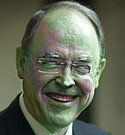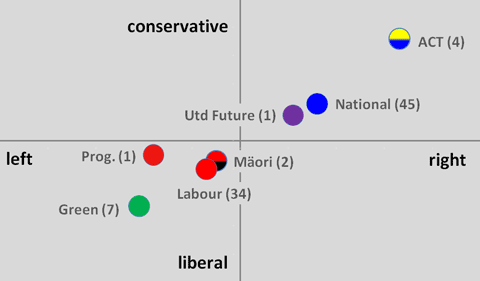 I opened the farming page of the Waikato Times yesterday evening to see a prediction from Lincoln University agribusiness professor Keith Woodford that the government is likely to dump the methane component from the ETS. He was speaking to farmers at a Lincoln sheep and beef seminar. The articleis on Stuff’s website.
I opened the farming page of the Waikato Times yesterday evening to see a prediction from Lincoln University agribusiness professor Keith Woodford that the government is likely to dump the methane component from the ETS. He was speaking to farmers at a Lincoln sheep and beef seminar. The articleis on Stuff’s website.
The basis for his prediction was political — in particular that the government couldn’t afford to lose the rural vote to ACT over climate change issues. However what struck me was not his political calculations but his claims about climate change.
There’s no consensus about the extent of climate change, he reportedly said, although some scientists claimed otherwise. He’s not saying there is no climate change, mark you, but pointing out that there’s a great deal of uncertainty “out there”. There’s an unfinished debate going on and anyone who says it is finished is either ignorant or untruthful.
In particular “some groups” have exaggerated fluctuating global temperatures, sea ice levels and the destruction of coral reefs. As for sea levels, they have been rising modestly for thousands of years, and earthquakes in New Zealand have tended to counterbalance that anyway.
Note the vagueness. Who are “some groups”? What is exaggerated about the rising trend in global temperatures which has been so painstakingly tracked? Are the sea ice extent graphs and measurements doctored? Is the concern of those who monitor coral reefs misplaced? Is the measured increase in the rate of sea level rise imaginary? Is there no loss of mass from the Greenland and West Antarctic ice sheets?
Woodford seems to think all the specifics can be waved away with words like “exaggerated” or “uncertainty” or “unfinished debate”. And he accuses those who feel they must take the science seriously of ignorance and untruthfulness!
In terms of what we are hearing from farming circles these days Woodford’s statements are pretty standard fare. The New Zealand farming community appears to be foolishly cocooning itself in a protective shell of denial that climate change can possibly be as serious a threat as sober science says it is. Federated Farmers has been pointedly describing climate change as climate variability. They talk to one another and not surprisingly confirm their opinions by frequent repetition. But one might have hoped that the academics among them might inject some reality into the conversation. Evidently not at this university seminar from this professor.
What we do about climate change is one thing. What we know about it is another. We may well be reluctant to take some actions, and there is certainly room for a variety of opinions as to how best to tackle the issue. The farming community may even have a case in relation to the ETS. But to bolster our preferences by claiming that the science is not settled enough to justify action is stupid and reckless. Where on earth does an academic like Woodford find the confidence to declare that there’s no consensus about the extent of climate change? Does he have the faintest idea of the scientific literature? Has he looked at any of the IPCC reports of what that literature reveals? Far from being marked by exaggeration the reports of climate scientists are on the whole marked by caution and caveat. That’s one of the reasons for taking seriously their generally agreed central findings.
The agribusiness professor no doubt has expertise in his own field. But he is only pretending to knowledge in climate science. He also confirms the prejudices of any farmers who likewise can’t be bothered to acquaint themselves with the reality of climate change. If farmers want to argue for exclusion from the ETS they should be doing so in full awareness of the climate crisis. Perhaps the trouble is that might undermine their case.
[Gareth adds: Keith Woodford is well-known for his role in promoting the health benefits of “A2” milk in his book Devil in the Milk: Illness, Health and Politics – A1 and A2 Milk. Perhaps less well-known is his 2006 paper Agriculture’s greenhouse emissions. How should they be calculated? in which he argued that NZ should use a 500-year timeline for calculating the global warming potential of methane in order to minimise its relevance to our emissions reduction activities. Woodford’s big idea has gained little traction, perhaps because it is impractical nonsense…]
Like this:
Like Loading...
 Confirmation that new ACT Party leader Don Brash still considers himself a climate sceptic comes in an interview he gave to arch-libertarian commentator Lindsay Perigo shortly before he launched his takeover putsch (starts as about 24:10 on the Youtube video). Brash happily confirms his scepticism, saying:
Confirmation that new ACT Party leader Don Brash still considers himself a climate sceptic comes in an interview he gave to arch-libertarian commentator Lindsay Perigo shortly before he launched his takeover putsch (starts as about 24:10 on the Youtube video). Brash happily confirms his scepticism, saying:


 I opened the farming page of the Waikato Times yesterday evening to see a prediction from Lincoln University agribusiness professor
I opened the farming page of the Waikato Times yesterday evening to see a prediction from Lincoln University agribusiness professor  Tomorrow morning, a large chunk of New Zealand’s much debated Emissions Trading Scheme comes into effect. Forestry’s already been in it for two years, but July 1st is the day that the liquid fuels and electricity generation sectors start to have to account for their emissions, and it’s the first day that consumers might see a change in fuel and electricity prices that can be blamed on the ETS. Last week’s National Business Review had a pretty good overview of the state of play
Tomorrow morning, a large chunk of New Zealand’s much debated Emissions Trading Scheme comes into effect. Forestry’s already been in it for two years, but July 1st is the day that the liquid fuels and electricity generation sectors start to have to account for their emissions, and it’s the first day that consumers might see a change in fuel and electricity prices that can be blamed on the ETS. Last week’s National Business Review had a pretty good overview of the state of play